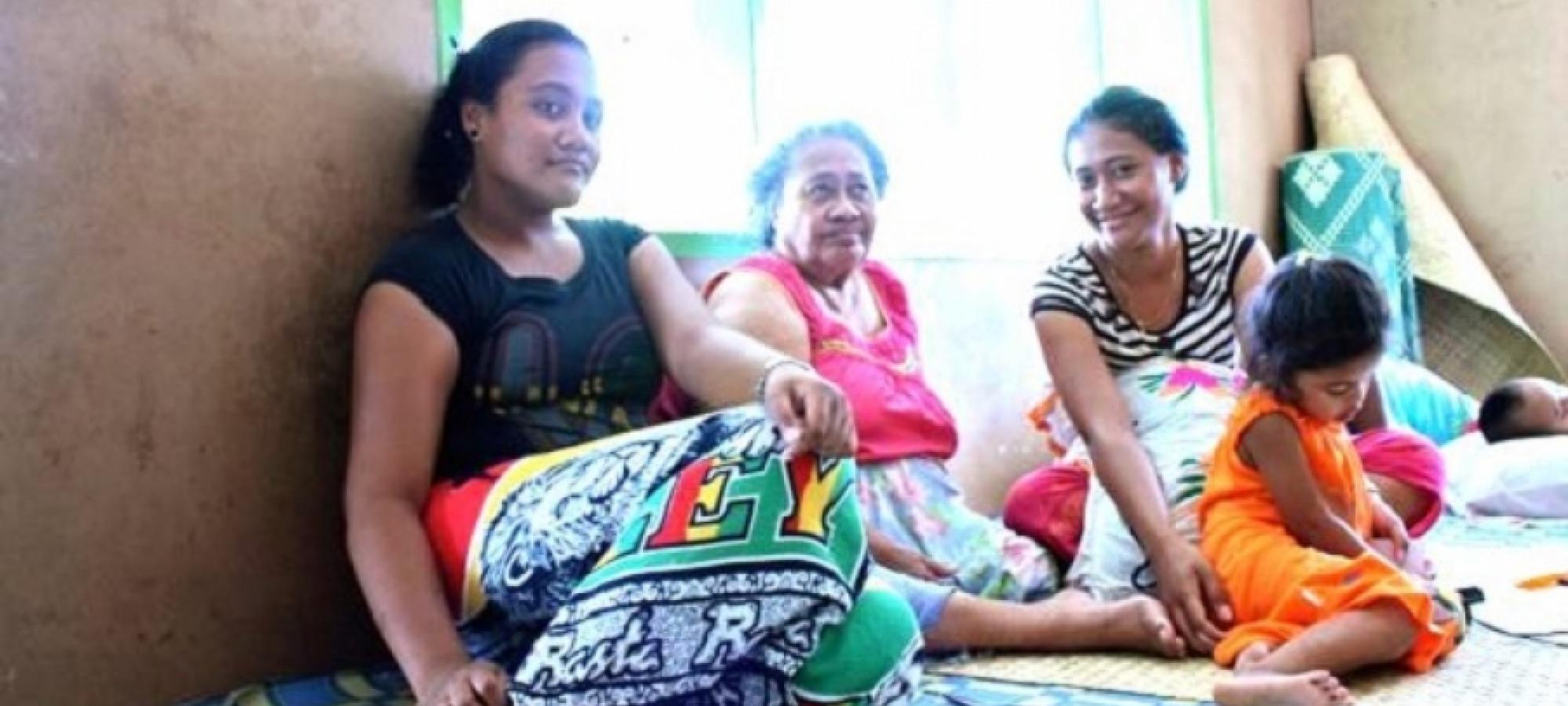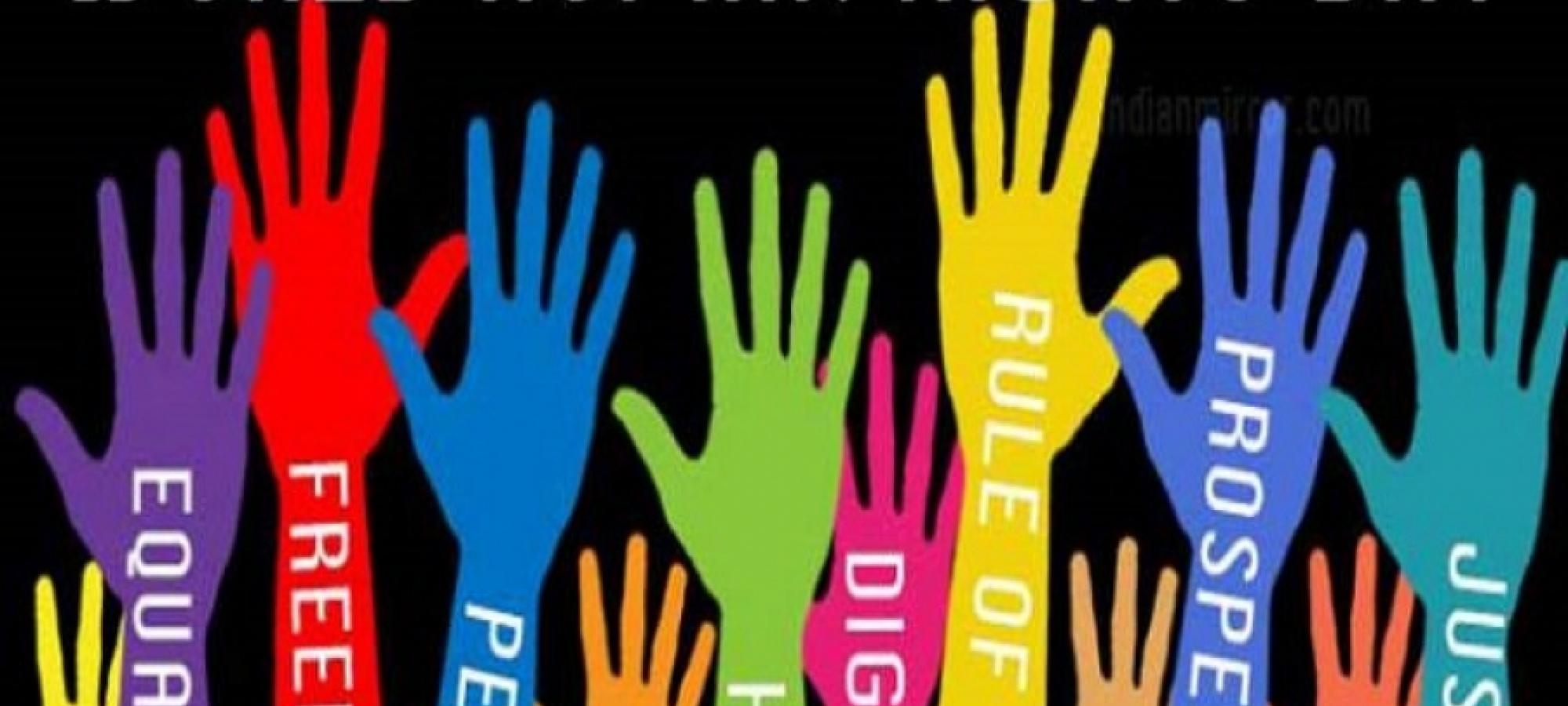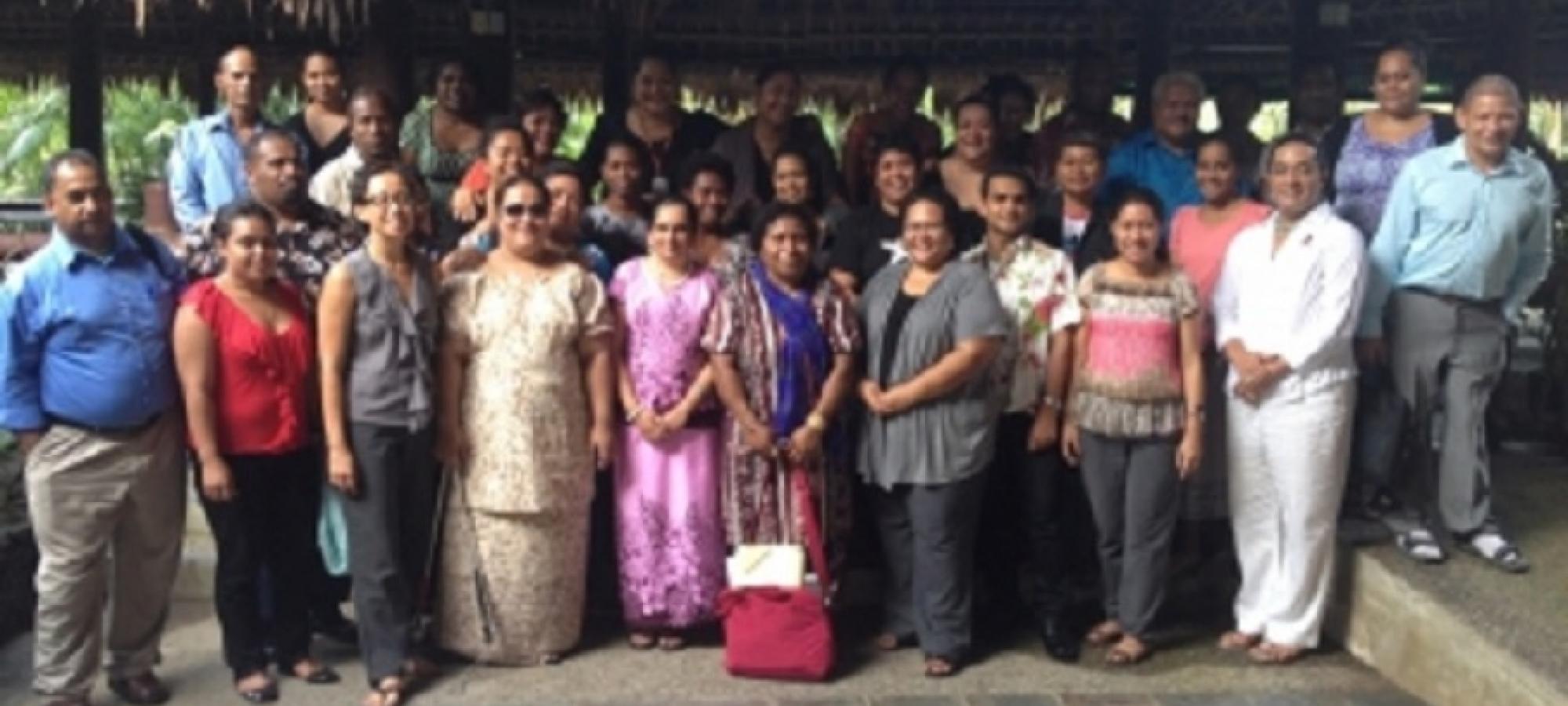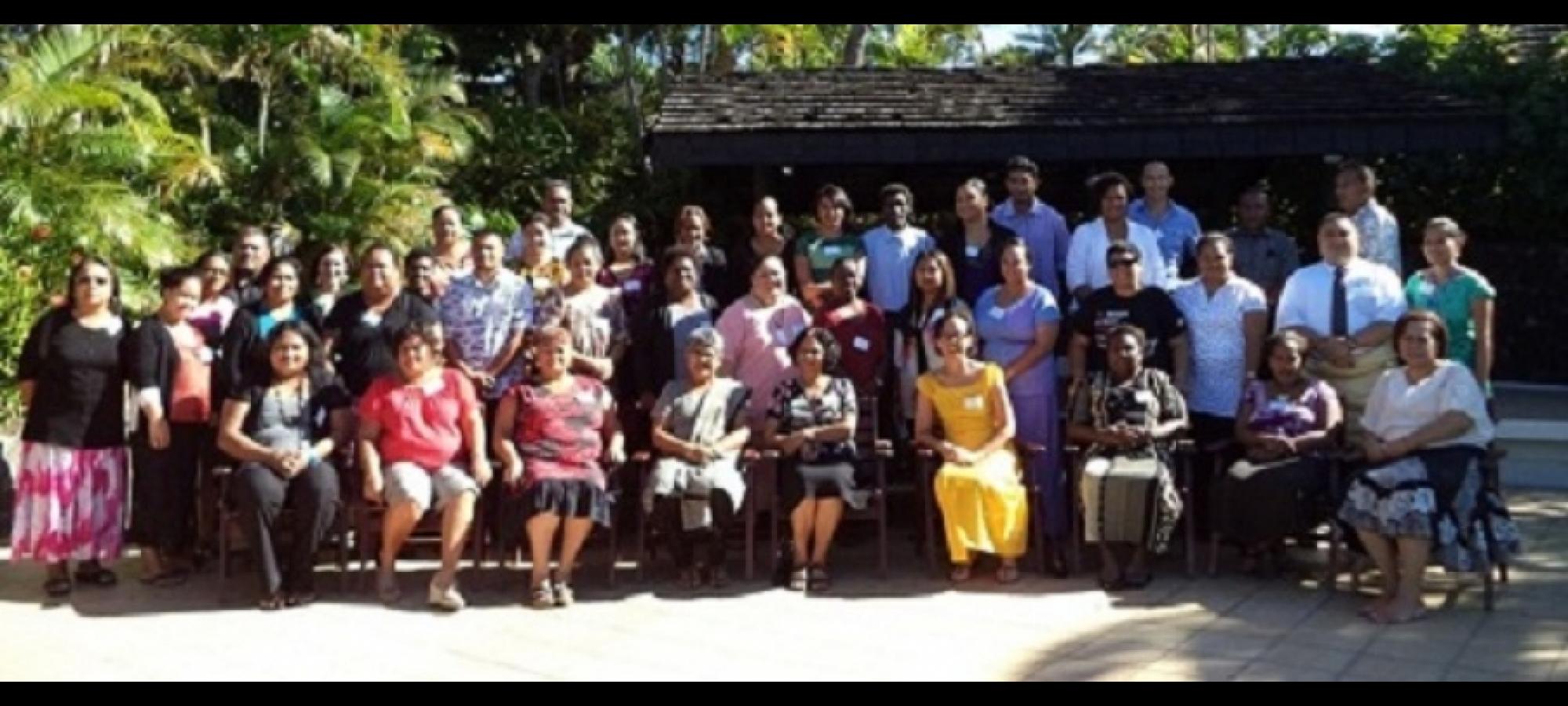Positive Approaches to Behaviour Management - Tuvaluan
This educational video resource has been produced to empower school stakeholders to effectively use non-physical behaviour management approaches in the classroom.

This educational video resource has been produced to empower school stakeholders to effectively use non-physical behaviour management approaches in the classroom.
This educational video resource has been produced to guide teachers and school stakeholders in carrying out their obligations to provide a safe environment for children in schools and in the community in accordance with Tuvalu Child Protection laws and policies.
This educational video resource has been produced to empower school stakeholders to effectively use non-physical behaviour management approaches in the classroom.
This educational video resource has been produced to guide teachers and school stakeholders in carrying out their obligations to provide a safe environment for children in schools and in the community in accordance with Tuvalu Child Protection laws and policies.
The NMIRF concept is a new one, and hence this video highlights how the identified countries (Kiribati, Vanuatu, Samoa) NMIRFs or similar structures are centrally placed not only to coordinate reporting but also to coordinate and track the follow-up recommendations or decisions of international and regional human rights mechanisms.

With his wealth of knowledge in parliamentary mechanisms and human rights, Mr Nikora was in Tuvalu last week sharing his experiences with newly elected members of Tuvalu’s parliament as an exchange organised by SPC through its Regional Rights Resource Team (RRRT), with assistance from the European Union (EU) and Australian Government.
“I was a member of parliament in Kiribati for 20 years and at the beginning of my term as an MP, I wasn’t confident because of my limited understanding of parliamentary processes. It took time and perseverance for me to become an active voice for my people in parliament. My three years of human rights work with SPC has also broadened my knowledge in human rights advocacy. I am honoured to be part of this great exchange this week to share my experiences with Tuvalu MPs,” Mr Nikora said.
Mr Nikora stressed that parliaments are the highest decision and law making institutions in our countries and it is important that elected members understand their role as guardians of human rights for their people.
“Without the right understanding of the parliamentary processes, the roles and responsibilities of MPs, it will be difficult to confidently represent the interests of constituents in any parliament,” Mr Nikora said.
The exchange is part of the induction seminar for Tuvalu’s parliament organised and supported by the United National Development Programme (UNDP) in partnership with the New Zealand House of Representatives, the Parliament of Victoria and SPC.
Tuvalu held its general elections in March 2015 that resulted in the formation of a new Government in April 2015.
The induction seminar briefed and guided the newly elected MPs with knowledge on their roles and responsibilities, with SPC RRRT providing technical assistance on human rights and good governance.
Honourble Speaker Tausi of the Parliament of Tuvalu invited RRRT to address all Parliamentarians following the success of a regional MPs Human Rights Consultation hosted by SPC which he attended in Fiji earlier this year.
The SPC RRRT Programme receives core funding from the Australian Government and additional funding from various donors including the EU. With the EU Pacific Islands Ratification & Implementation of Human Rights Treaties project implemented through the Pacific Islands Forum Secretariat (PIFS), RRRT works to support Forum Island countries to ratify, implement and report on core United Nations human rights conventions and the Rome Statute of the International Criminal Court.
SPC is the principal scientific and technical agency supporting development in the Pacific Island region. It works to build a human rights culture that enhances the rule of law and democracy in the Pacific region. Promoting the use of human rights standards in law, practice and policy is part of SPC’s Regional Rights Resource Team’s broad, long-term strategy for achieving that goal.
Jilda Shem, SPC Communications Officer, [email protected], Phone: +679 9314174
Sanya Ruggiero, EU Press and Information Intern, [email protected]

The Act provides for greater protection from violence within domestic relationship to ensure the safety and protection of all people, including children, who experience or witness domestic violence. The Act recognises that domestic violence, in all its forms, is unacceptable behaviour and a crime.
Violence against women and within the family is a human rights violation, depriving women and children of their right to a safe and secure family life.
SPC RRRT has been providing support to the Government of Tuvalu through the drafting of the Bill in 2011 as well as providing a set of drafting instructions on violence against women legislation that is compliant with global human rights standards and supporting community and national consultations on the Bill in 2013 and in 2014.
The Tuvalu 2007 Demographic and Health survey reported that four in ten women have been subjected to some type of physical violence, with their current husbands or partners being the main perpetrators. Women whose husbands drink alcohol excessively are far more likely to experience physical, emotional, or sexual violence than those whose partner does not drink. Around half of all reported acts of physical violence were reported by women aged 25-29.
Inadequate laws and policies, fail to protect women and their families, and impact adversely on the development of a country. The passing of the Family Protection and Domestic Violence Act is a milestone for Tuvalu in that it is one of a variety of national strategies to eliminate all forms of violence against women, which is a key policy outcome in the Tuvalu’s National Gender Policy of 2014.
Since 2013, SPC RRRT has supported the legislatures of Tuvalu, Kiribati, Solomon Islands and Tonga have all passed domestic violence legislation to protect their citizens from violence against women and girls.
Violence against women has a broad and lasting impact on the well-being of women and girls, families and communities, including the emotional, physical and psychological well-being of the survivors. Domestic violence also impacts national development by creating a burden on national social systems and services such as health care, police, legal aid, crisis centres and other response services.
SPC RRRT works to build a culture of human rights and assists nation states to commit to, and observe, international human rights standards. SPC RRRT is a programme under the Social Development Division of the Secretariat of the Pacific Community and is funded by the Australian Government.
For more information, please contact Jilda Shem, SPC RRRT Communications Officer on +679 330 5994 or email [email protected] Photo caption: Tuvalu women in a community setting, source: http://klima-tuvalu.no/wp-content/uploads/2011/02/IMG_4862.jpg

‘The National Human Rights Awards initiative is aimed at rewarding and celebrating outstanding work in human rights in the Pacific region and also to send a clear message to human rights defenders that the Pacific community is grateful for, and supports, their tireless efforts to promote human rights for all,’ the Deputy Director of SPC’s Regional Rights Resource Team (RRRT), Mark Atterton, said.
The theme for the awards is ‘human rights in everyday life’, which covers many aspects of our daily lives, including rights to food, shelter, education, health, protection, freedom of expression and many more.
The Pacific is not immune to human rights violations, with violence against women a critical concern for the region. According to studies by the United Nations Population Fund (UNFPA) in collaboration with SPC, the Pacific region has some of the highest rates of violence against women in the world.
National studies in 2009 and 2010, in Samoa, Kiribati, the Solomon Islands, Tonga, Fiji and Vanuatu, indicate that the rates of intimate partner violence are as high as 60 to 70%. Inadequate laws and policies fail to protect women and their families, and impact adversely on the development of a country.
At a recent SPC-RRRT regional lawyers’ consultation, former high court judge in Fiji, Madam Mere Pulea, encouraged lawyers of the region to ‘be at the forefront to challenge inequalities and discrimination faced by women, and to play a critical role for the benefit of society.’
‘The need to champion gender equality is pivotal to the development and realisation of human rights, and to sustainable development in the region,’ said Mark Atterton.
SPC RRRT won the prestigious UNICEF Maurice Pate Award in 1998 for its pioneering work in promoting human rights education for women and children in the Pacific. Since then, SPC RRRT has been offering the Pacific Human Rights Awards to encourage the development of a human rights culture that will protect the rights and promote the well-being of disadvantaged and vulnerable groups.
The 2014 national awards include:
Rikiaua Takeke
Special recognition for highlighting the right to religion through the documentation of Catechist Tikarerei Takirua’s life story of service to the people of Kiribati.
Selaina Tekonnang
Special recognition for highlighting the right to marriage and to be free from violence through poetry.
Wayne Uan
Special recognition for highlighting the right to participate in any community activities without distinction of any kind such as sex, colour, race, religion or other status.
Aoga Fiamalamalama
Special recognition for promoting the right of a child to education in Samoa, including children with disabilities, through role play.
Deborah Jacinta Leu’o
Special recognition for promoting human rights in Samoa through creative drawing.
Faaolo Utumapu-Utailesolo
Special recognition for highlighting the rights of persons with disabilities through the documentation of her personal life story.
Hemiriah Ioane
Special recognition for highlighting the right to education through creative writing.
Nu’ufou Isaia
Special recognition for promoting the right to education for children with disabilities in Samoa, through visual art.
Piu Maneralokina Filipo
Special recognition for highlighting human rights through creative writing.
Samoa Fa’afafine Association
In recognition of the contribution to the promotion of the human rights of marginalised groups, including Fa’afafine and LGBTI groups in Samoa.
Samoa National Youth Council
Special recognition for promoting the right to be heard and of freedom of expression in Samoa through audio visual arts.
Samoa Returnees Charitable Trust
Contribution to advancing the right to freedom from discrimination of Samoan deportees rehabilitating in the community and in community outreach programmes.
Sinalaua Papatoetoe Tupolo
Special recognition for highlighting the right to education, respect and equality through the documentation of her personal life story.
Taiese Taiese
Special recognition for highlighting the right of children to social protection through creative writing.
Tiapapata Art Centre
Special recognition for advancing the right to develop life skills and the right to participate in cultural life, through the Breakthrough initiative, aimed at supporting people affected by trauma and abuse.
Br. Gorge Van Der Sant
Special recognition for contribution to advancing the right to education for young persons with disabilities in Solomon Islands.
Community Based Rehabilitation Unit
Special recognition for contribution to advancing the rights of persons with disabilities in Solomon Islands.
Women and Children Crisis Centre
Special recognition for advancing the rights of girls in Tonga to be free from domestic violence and sexual abuse.
Talitha Girls
Special recognition for highlighting the rights of single mothers to education and to be respected with equal opportunity.
Elenga Mailangi
Special recognition for highlighting the right to employment and family support in Tonga.
Fusi Alofa Association
Special Recognition for contribution to advancing the rights of persons with disabilities in Tuvalu.
Talafai Youth Group
Special recognition for contribution to advancing the rights of children to education through support to pre-school building construction on the island of Nanumago, Tuvalu.
SPC RRRT works to build a culture of human rights, and assists nation states to commit to, and observe, international human rights standards. SPC RRRT is a programme under the Social Development Division of the Secretariat of the Pacific Community and is funded by the Australian Government.
For more information, please contact Jilda Shem, SPC RRRT Communications Officer, on +679 330 5994, or email [email protected]

SPC RRRT is pleased to invite one representative from Civil Society and one youth representative from each of the following Pacific Island Countries: Cook Islands, Federated States of Micronesia, Fiji, Kiribati, Nauru, Niue, Palau, Papua New Guinea, Republic of Marshall Islands, Samoa, Solomon Islands, Tonga, Tuvalu and Vanuatu
Download the conference announcement below for further details and the application form if you are interested to represent your country. Email us your completed form as soon as possible.
SPC_meeting_announcement_Regional_Youth_and_CSO_Dialogue_1.pdf

Monday 10 June 2013, Secretariat of the Pacific Community (SPC), Suva, Fiji –
In her remarks at the opening ceremony of the consultation, guest speaker Shamina Ali, Coordinator of the Fiji Women’s Crisis Centre, called for gender specific domestic violence laws in the Pacific as a vital way forward in addressing discrimination against women in the region.
‘The use of gender neutral laws in addressing domestic violence ignores the reality of the nature of domestic violence, and is ineffective in the context of a patriarchal society. It is well established that cultural norms and societal values in Fiji and the Pacific are predominantly patriarchal, and that women’s access to justice is restricted,’ Ms Ali said.
A good example of gender specific domestic violence law, Ms Ali added, is India’s Protection of Women from Domestic Violence Act of 2005. The act guarantees a women’s right to reside in the matrimonial or shared household, irrespective of whether she has any title or rights in the property.
Other presentations during the opening ceremony reaffirmed the findings of national surveys showing the high prevalence of violence against women in the Pacific. The recent research shows rates of 68% in Kiribati, 60% in Vanuatu, 64% in Solomon Islands, 46% in Samoa and 61% in Fiji.
Participants were also reminded that legislation is only one aspect of the work needed to address violence against women; it is equally important to ensure resources are available for the implementation of the laws and to monitor progress.
Activities on the agenda for this week’s consultation include reviewing legislation to address violence against women in the region and lessons learnt from national committees and consultations, sharing lessons on law reform strategies undertaken in countries and developing plans to progress legislative law reform in the Pacific.
This consultation is the 5th organised since 2009 and is part of SPC RRRT’s programme to develop and support comprehensive integrated legislation that addresses all forms of violence against women. The aim is to build capacity at the national level to advocate for improved legislation through the development of appropriate policy papers and comprehensive legislative reviews encompassing all aspects of legislative change that affect women suffering from violence.
The consultation this week is being attended by government and civil society stakeholders including legal drafters from Cook Islands, Kiribati, Federated States of Micronesia, Nauru, Samoa, Solomon Islands, Tonga, Tuvalu and Vanuatu. This consultation and work to support legislative change in addressing violence against women is supported by the Australian Agency for International Development (AusAID).
For more information, please contact Jilda Shem, SPC RRRT Communications Officer on +679 330 5994 or email [email protected].